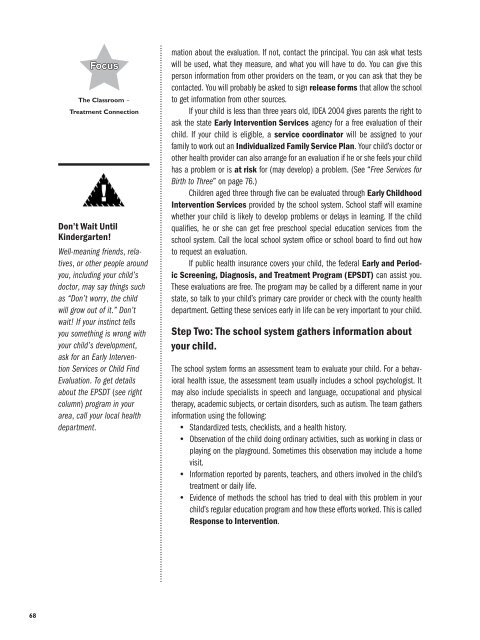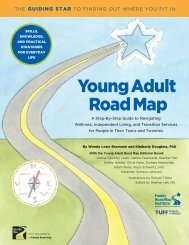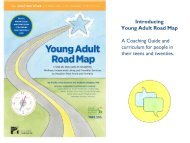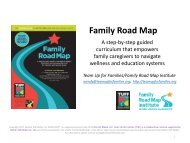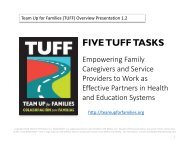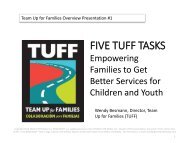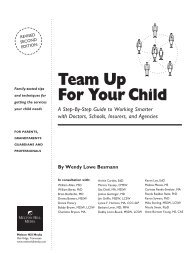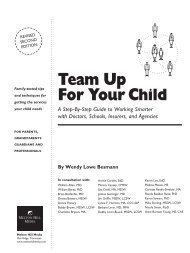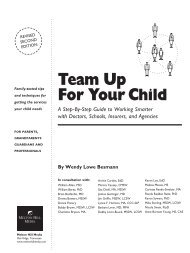Family Road Map Guide
Create successful ePaper yourself
Turn your PDF publications into a flip-book with our unique Google optimized e-Paper software.
Focus<br />
The Classroom –<br />
Treatment Connection<br />
Don’t Wait Until<br />
Kindergarten!<br />
Well-meaning friends, relatives,<br />
or other people around<br />
you, including your child’s<br />
doctor, may say things such<br />
as “Don’t worry, the child<br />
will grow out of it.” Don’t<br />
wait! If your instinct tells<br />
you something is wrong with<br />
your child’s development,<br />
ask for an Early Intervention<br />
Services or Child Find<br />
Evaluation. To get details<br />
about the EPSDT (see right<br />
column) program in your<br />
area, call your local health<br />
department.<br />
mation about the evaluation. If not, contact the principal. You can ask what tests<br />
will be used, what they measure, and what you will have to do. You can give this<br />
person information from other providers on the team, or you can ask that they be<br />
contacted. You will probably be asked to sign release forms that allow the school<br />
to get information from other sources.<br />
If your child is less than three years old, IDEA 2004 gives parents the right to<br />
ask the state Early Intervention Services agency for a free evaluation of their<br />
child. If your child is eligible, a service coordinator will be assigned to your<br />
family to work out an Individualized <strong>Family</strong> Service Plan. Your child’s doctor or<br />
other health provider can also arrange for an evaluation if he or she feels your child<br />
has a problem or is at risk for (may develop) a problem. (See “Free Services for<br />
Birth to Three” on page 76.)<br />
Children aged three through five can be evaluated through Early Childhood<br />
Intervention Services provided by the school system. School staff will examine<br />
whether your child is likely to develop problems or delays in learning. If the child<br />
qualifies, he or she can get free preschool special education services from the<br />
school system. Call the local school system office or school board to find out how<br />
to request an evaluation.<br />
If public health insurance covers your child, the federal Early and Periodic<br />
Screening, Diagnosis, and Treatment Program (EPSDT) can assist you.<br />
These evaluations are free. The program may be called by a different name in your<br />
state, so talk to your child’s primary care provider or check with the county health<br />
department. Getting these services early in life can be very important to your child.<br />
Step Two: The school system gathers information about<br />
your child.<br />
The school system forms an assessment team to evaluate your child. For a behavioral<br />
health issue, the assessment team usually includes a school psychologist. It<br />
may also include specialists in speech and language, occupational and physical<br />
therapy, academic subjects, or certain disorders, such as autism. The team gathers<br />
information using the following:<br />
• Standardized tests, checklists, and a health history.<br />
• Observation of the child doing ordinary activities, such as working in class or<br />
playing on the playground. Sometimes this observation may include a home<br />
visit.<br />
• Information reported by parents, teachers, and others involved in the child’s<br />
treatment or daily life.<br />
• Evidence of methods the school has tried to deal with this problem in your<br />
child’s regular education program and how these efforts worked. This is called<br />
Response to Intervention.<br />
68


